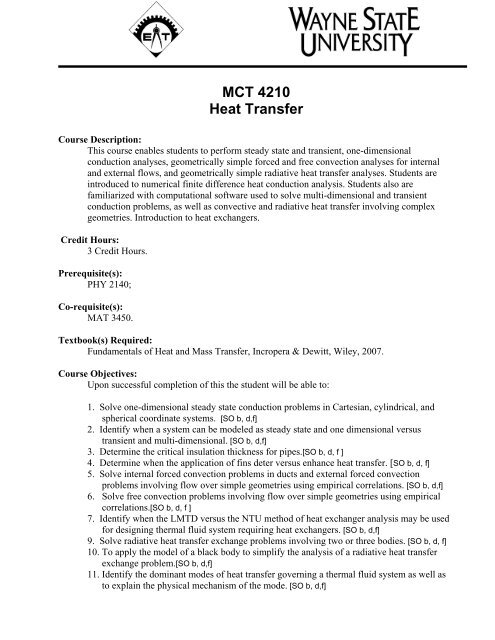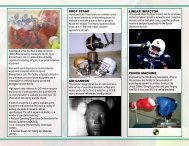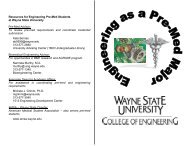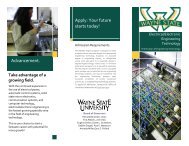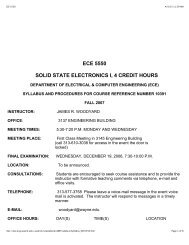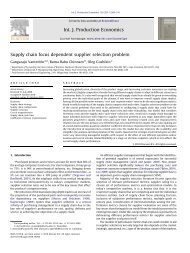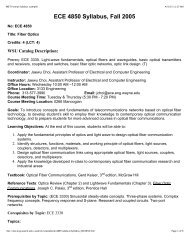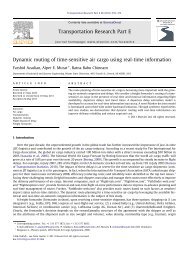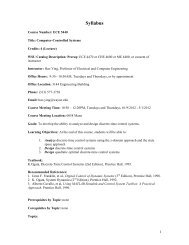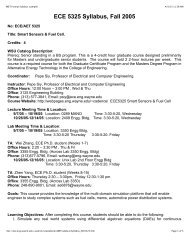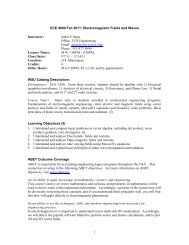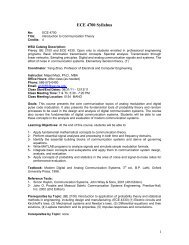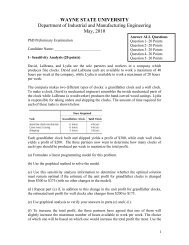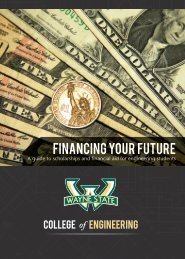MCT 4210 Heat Transfer
MCT 4210 Heat Transfer
MCT 4210 Heat Transfer
Create successful ePaper yourself
Turn your PDF publications into a flip-book with our unique Google optimized e-Paper software.
12. To reiterate the physical meaning of the dimensionless parameters utilized in heat transferanalyses. [SO b, d,f]13. Identify when computational tools are needed to solve thermal-fluid problems based onthe complexity of the problem and the level of detail/precision required for the dependentvariables. [SO a, b, d,f]14. Exhibit responsibility in handling of thermal-fluid lab equipment and work effectively as agroup in a laboratory environment. [SO c]Topics Covered:1. Steady state one dimensional conduction.2. Numerical Methods3. Internal flow forced convection.4. External flow forced convection.5. Free convection from simple geometries.6. <strong>Heat</strong> exchanger analysis.7. View factors.8. Radiative heat exchange between two/three bodies.9. Computational Fluid Dynamics: Capabilities.Laboratory/Projects:1. Project I. [SO g, M2]2. Radiative <strong>Heat</strong> <strong>Transfer</strong> using Radiation Cube [SO c, g, M2]3. Thermal Conuctivity Apparatus [SO, c, g, M2]4. Thermal Software Demonstration [So a]5. Numerical Thermal Analysis I [SO g, M2]6. Project II [SO g, M2]Contributions to <strong>MCT</strong> Student Outcomes:LevelBS<strong>MCT</strong> Program Student Outcomesa. an ability to select and apply the knowledge, techniques, skills, and modern tools of2their disciplines to broadly-defined engineering technology activitiesb. an ability to select and apply a knowledge of mathematics, science, engineering, and2 technology to engineering technology problems that require the application ofprinciples and applied procedures or methodologiesc. an ability to conduct standard tests and measurements; to conduct, analyze, and2interpret experiments; and to apply experimental results to improve processesd. an ability to design systems, components, or processes for broadly-defined2engineering technology problems appropriate to program educational objectives1 e. an ability to function effectively as a member or leader on a technical teamf. an ability to identify, analyze, and solve broadly-defined engineering technology3problemsg. an ability to communicate effectively regarding broadly-defined engineering technology2activitiesh. an understanding of the need for and an ability to engage in self-directed continuingprofessional developmenti. an understanding of and a commitment to address professional and ethicalresponsibilities including a respect for diversityj. a knowledge of the impact of engineering technology solutions in a societal and global1contextk. a commitment to quality, timeliness, and continuous improvementM1 – <strong>MCT</strong> Design Track: Students in this track will demonstrate the ability to applyprinciples of materials and mechanics to the design and analysis of mechanicalcomponents and mechanisms.
3M2 – <strong>MCT</strong> Energy Track: Students in this track will demonstrate the ability to applyprinciples of thermo-fluid sciences to the design and analysis of energy systemsM3 – <strong>MCT</strong> Manufacturing Track: Students in this track will demonstrate the ability toapply principles of materials and production techniques to the planning,implementation, and control of manufacturing processesA 95-100A- 90-94B+ 87-89B 83-86B- 80-82C+ 77-79C 73-76C- 70-72D+ 67-69D 63-66D- 60-62F Below 60WITHDRAWAL POLICY:Last day to drop with a tuition refund: End of 2 nd Week of SemesterLast day to drop without a notation of W on the transcript: End of 4 th WeekFinal day to drop with W (ET Students): End of 8 th WeekAll drop/add activity during the first four weeks should be done by the student through Pipeline.Withdrawal after the fourth week requires the instructor’s permission and must be submitted on aDrop/Add form to the Registrar’s Office. Withdrawal after the ‘final drop’ date will only bepermitted under exceptional circumstances and requires the permission of the Chair of the ETDivision. A failing grade is not an acceptable reason for withdrawal after the ‘final drop’ date.POLICY ON CHEATING:Cheating is defined by the University as “intentionally using or attempting to use, or intentionallyproviding or attempting to provide, unauthorized materials, information, or assistance in anyacademic exercise.” This includes any group efforts on assignments or exams unless specificallyapproved by the professor for that assignment/exam. Evidence of fabrication or plagiarism, asdefined by the University in its brochure Academic Integrity, will also result in downgrading forthe course. Students who cheat on any assignment or during any examination will be assigned afailing grade for the course and may be subject to additional penalties.University / Department Policies:Academic Misconducthttp://www.et.eng.wayne.edu/et/academicmisconduct/academicmisconduct.htmlWithdrawal from Engineering Tech classeshttp://www.et.eng.wayne.edu/et/withdrawal/withdrawal.html
Deferred Gradeshttp://www.et.eng.wayne.edu/et/deferredgrade/deferredgrade.htmlCode of Ethics for Engineers:http://cems.alfred.edu/courses/ces120/ethics/abet.htmlhttp://cems.alfred.edu/courses/ces120/ethics/ieee.htmlhttp://onlineethics.org/codes/http://www.iit.edu/departments/csep/codes/coe/abet-a.htmlPrepared by:


